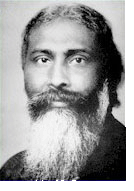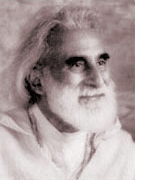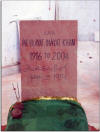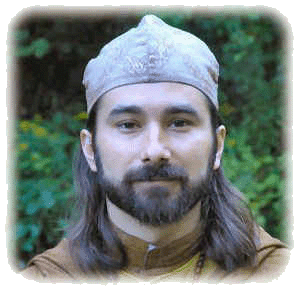|

 PIR-O-MURSHID
INAYAT KHAN, founder of the Sufi Order in the west, was born in Baroda,
India, on July 5, 1882, into a family of great musicians. As a child, Inayat
Khan took a great interest in music and visits to holy men. Due to his deep
love of the Indian musical heritage, which had become very decadent, he dedicated
his early life to reinstalling the spiritual value of music by traveling and
performing in the high classical style. One of the greatest patrons of music,
the Nizam of Hyderabad, responded to Inayat Khan's singing by awarding him the
greatest musical title in India: Tansen of India. PIR-O-MURSHID
INAYAT KHAN, founder of the Sufi Order in the west, was born in Baroda,
India, on July 5, 1882, into a family of great musicians. As a child, Inayat
Khan took a great interest in music and visits to holy men. Due to his deep
love of the Indian musical heritage, which had become very decadent, he dedicated
his early life to reinstalling the spiritual value of music by traveling and
performing in the high classical style. One of the greatest patrons of music,
the Nizam of Hyderabad, responded to Inayat Khan's singing by awarding him the
greatest musical title in India: Tansen of India.

Inayat Khan had fulfilled his purpose in music and began to look for a spiritual
teacher. He found his ideal teacher in the being of Hazrat Abu Hashim Madani,
the successor to one of the branches of the Chisti Sufi Order in India. After
taking the sacred vow of initiation, he went through a course of training in
the four Sufi Schools: Chishti, Naqshbandi, Qadiri, and Shurawardi. Before Abu
Hashim Madani died, he called his pupil Inayat Khan to his bedside to bless
him and enjoin him to bring the message of Sufism to the West, saying that he
had received the order from Moinuddin Chisti, founder of the Chisti Order in
India.
Following the call of God, Inayat Khan left India for the Western world on
September 13, 1910. He landed in America, and later traveled to Europe and Russia,
sowing the seeds of Sufism.
The Sufi Message does not call a person away from a belief
or church;
it calls one to live it.
-- Pir-o-Murshid Inayat Khan
Top

 Pir
Vilayat Inayat Khan was born in London in 1916 and passed away in Suresnes,
France on June 17, 2004 (Pir Vilayat's obituary).
He was the son of the Sufi Master Pir-o-Murshid Inayat Khan and Ora Ray Baker. His
early years were thus imbued with both the rich mystical tradition of the East and
the heritage of the West. Pir
Vilayat Inayat Khan was born in London in 1916 and passed away in Suresnes,
France on June 17, 2004 (Pir Vilayat's obituary).
He was the son of the Sufi Master Pir-o-Murshid Inayat Khan and Ora Ray Baker. His
early years were thus imbued with both the rich mystical tradition of the East and
the heritage of the West.
His later training also reflects the synthesis of East and West. He studied philosophy
and graduated with a degree in psychology from Paris University, later did postgraduate
work at Oxford, and also studied music at l'Ecole Normale de Musique de Paris. He
then began an intensive practice of meditation in India and the Middle East with
Sufi masters and teachers of various meditative disciplines, and carried out long
periods of seclusion and retreat.
In 1926 his father named him to be his successor and head of the Sufi Order and
the Confraternity of the Message. Later, when he came of age, he was confirmed as
by the Sufis in Ajmer, India. In accordance with this background, Pir Vilayat exemplified
the global consciousness of the emerging holistic age, allowing him to fulfill his
position as successor to Pir-o-Murshid Inayat Khan in the line of Murshids of the
Chisti Order, and present the message of unity.
Pir Vilayat Inayat Khan was a well-known teacher of meditation, presenting seminars,
camps and retreats throughout the United States, Western Europe, and India. The
training he gave integrated a broad spectrum of meditation techniques from many
traditions. In seminars intended especially for psychologists and educators, he
demonstrated ways to adapt meditation to the needs and traumas of people in our
age. A particular focus in his work was his dedication to the retreat format as
means of enabling personal transformation. transformation.
Owing to his efforts to bridge the experience of contemplatives and the findings
of physicists, biologists and psychologists, he was a popular speaker at symposia
on science, religion and holistic medicine. He convened religious congresses in
various parts of the world, bringing together teachers from a variety of denominations
in mutual respect and recognition of their underlying unity.
Pir Vilayat Inayat Khan is the author of numerous books, including Introducing
Spirituality into Counselling and Therapy, The Call of the Dervish,
The Message in Our Time, Toward the One, and That Which Transpires
Behind that Which Appears. His most recent books are In Search of the Hidden
Treasure - A Conference of Sufis (Tarcher/Putnam, ISBN 1-58542-180-4) and
Awakening - A Sufi Experience (Tarcher/Putnam, ISBN 0-87477-974-X).
Top

 Pir
Zia Inayat Khan is the son and successor of Pir Vilayat
Inayat Khan. In addition to the interfaith mystical training he has received from
his father, Pir Zia has studied Buddhism under the auspices of His Holiness the
Dalai Lama, and Sufism in the classical Indian tradition of the Chishtiyya. He combines
these diverse influences in his being and in his teaching. In the true spirit of
the message of Inayat Khan, Pir Zia brings together not only leaders of different
Sufi traditions, but also representatives of the world's faiths. Pir
Zia Inayat Khan is the son and successor of Pir Vilayat
Inayat Khan. In addition to the interfaith mystical training he has received from
his father, Pir Zia has studied Buddhism under the auspices of His Holiness the
Dalai Lama, and Sufism in the classical Indian tradition of the Chishtiyya. He combines
these diverse influences in his being and in his teaching. In the true spirit of
the message of Inayat Khan, Pir Zia brings together not only leaders of different
Sufi traditions, but also representatives of the world's faiths.
He is the editor of A Pearl in Wine: Essays on
the Life, Music, and Sufism of Hazrat Inayat Khan (Omega Publications, 2001). He
has also authoured two booklets published by the Sufi Order Secretariat: Risala,
and the Chishti Silsila of Pir-o-Murshid Inayat Khan. He currently resides and teaches
at The Abode of The Message in New Lebanon, New York.
Pir Zia exemplifies a new generation of spiritual teachers. He is keenly
aware of the needs of the present day, of a world in crisis, and an emerging
spirituality of the future, built upon the centuries-old tradition of the Sufi
Masters. |